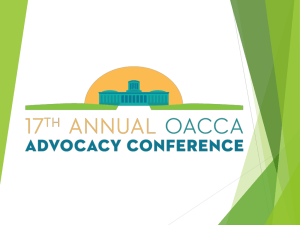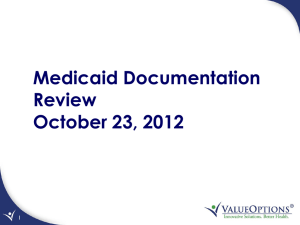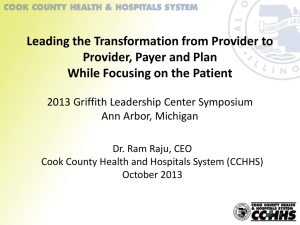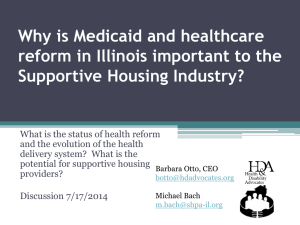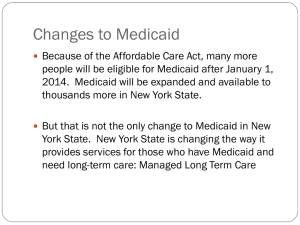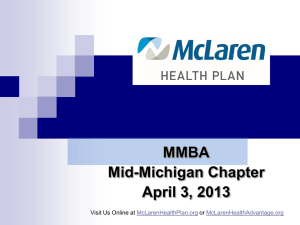Shea_Putnam_AccessingResources
advertisement
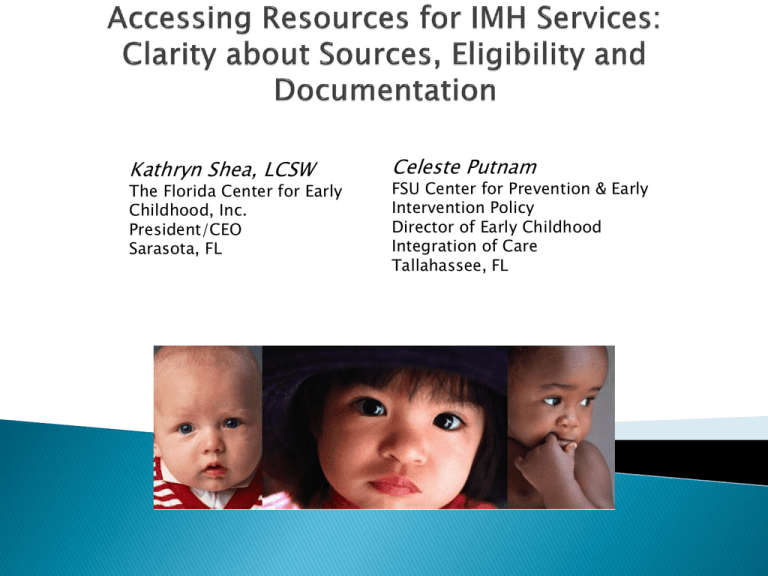
Kathryn Shea, LCSW The Florida Center for Early Childhood, Inc. President/CEO Sarasota, FL Celeste Putnam FSU Center for Prevention & Early Intervention Policy Director of Early Childhood Integration of Care Tallahassee, FL Florida Legislature created the Statewide Medicaid Managed Care Reform. Implementation is underway now – May through October Families will receive a series of notification letters starting 90 days before implementation by Region. 2 Managed Medical Assistance (MMA) Plans will provide all the state plan services to the vast majority of Medicaid recipients The MMA health plans will be operated by Health Maintenance Organizations and Provider Service Networks 3 Health Plans were selected through a competitive process The number of plans per Agency for Health Care Administration (AHCA) Region were specified in Legislation Plans will be integrated- will provide both behavioral health and physical health services 4 Medipass will end as the health plans roll out and will terminate in October 2014 Behavioral Health Prepaid Mental Health Plans will end as the health plans roll out (Value Options, Megellan) 5 Medicaid selected several specialty plans for populations with special health care needs Sunshine State Health Plan will be available for children in the child welfare system (voluntary) Magellan Complete Care will be available for persons with severe mental illness (voluntary) 6 Children’s Medical Services (CMS) will provide integrated health care services to children through a managed care network. Children must have special healthcare needs Enrollment is voluntary 7 8 Regions 2, 3, & 4 Regions 5, 6, & 7 Regions 10 & 11 Regions 1, 7, & 9 5/1/2014 6/1/2014 7/1/2014 8/1/2014 Implementation Date Regions: Standard Plans Amerigroup Better Health Coventry First Coast Advantage Humana Integral Molina Preferred Prestige SFCCN Simply Sunshine State United Healthcare Staywell 2 3 4 5 6 X X X 8 10 11 1 X X 7 9 X X X X X X X X X X X X X X X X X X X X X X X X X X X X X X X X X X X X X X X X X X X X X X X X X X X X X X X X X X X X Specialty Plans Magellan Complete Care (Serious Mental Illness) Sunshine State (Child Welfare) X X X X X 9 Young children and their families are eligible for health care services. Eligibility ◦ ◦ ◦ ◦ ◦ Pregnant women – 191% of poverty Infants under age 1- 206% of poverty Children ages 1-5 – 140% of poverty Children ages 6-19 – 133% of poverty Child Welfare out of home and up to age 26 10 Critical Changes in 2001 Handbook: ◦ In-Depth Assessment – Early Childhood Best Practice “2. Be exhibiting symptoms of an emotional or behavioral nature that are atypical for the child’s age and development. For children 0 through 3 years of age, Medicaid encourages use of the Diagnostic Classification of Mental Health and Development Disorders of Infancy and Early Childhood (DC: 0–3) for assistance in determining the infant or child’s ICD-9CM diagnosis.” 11 Critical Changes in 2001 Handbook: ◦ Individual AND FAMILY Therapy (family added) Individual and family therapy services include the provision of insight oriented, cognitive behavioral, or supportive therapy to an individual or family. Individual and family therapy may involve the recipient, the recipient’s family (without the recipient present), or a combination of therapy with the recipient and the recipient’s family. Allows for providing and billing dyadic therapy 12 New Revised Handbooks (3) – 2014 Significant Changes ◦ No specific “Services for 0-5 Section” ◦ No mention of encouraging use of DC: 0-3R 13 Significant Changes: ◦ No ICD-9CM/ICD-10 codes excluded ◦ Two new Provider titles: Bachelor’s Level Infant ◦ Mental Health Practitioner and Infant Mental Health Aides ◦ Does designate that assessments/services for recipients under the age of 6 years must be provided by the approved professionals “who have training and experience in infant, toddler, and early childhood development and the observation and assessment of young children.” *Seeking clarification from AHCA in some areas. 14 General Medicaid Rules ~ Rule #1 – KNOW THE HANDBOOK!!!!!!! The ultimate “reimburse-ability” of a service by Medicaid will depend upon the quality and content of the documentation. If an activity is not documented in the record, from a legal point of view, the activity did not take place. 15 Rule #2: Remember who the “client” is! ◦ Unless you are treating the parent for a specific mental health disorder, the infant/child is the “identified client”. The chart is opened under the child’s name. ◦ All documentation must focus on the child’s diagnosis, course of treatment, and discharge planning. ◦ Treatment goals are focused on the child’s improvement with the parent providing the mechanism/vehicle for child’s improvement. 16 General Medicaid Rules~ ◦ All entries must be typed or handwritten using only black ink ◦ Entries must be individualized to each child ◦ All entries must be legible and kept in chronological order ◦ All entries must be dated and legibly signed by the therapist who rendered the service using full name, credentials, and professional title 17 General Medicaid Rules~ ◦ Person(s) referenced in the documentation should be identified at least once on each Progress Note Page (i.e. Harry [cousin of client]) ◦ Errors in notes – If an entry is erroneous or incorrect, clearly draw one line through the error; write “error” to the side in parentheses; enter the correction; add signature, title, and the date; if an explanation seems appropriate, do not hesitate to clarify why the correction is needed. 18 General Medicaid Rules~ ◦ Entries should be made in the record at the time the service is rendered ◦ Document that the services provided correspond to the billing in the type of service, amount of service (length of time the activity took), the service date and entry date. ◦ Assure the activities are documented with detail sufficient to support the “amount of service” billed to Medicaid. 19 General Medicaid Rules~ ◦ Activities claimed for reimbursement must be meaningful and appropriate for the needs of each individual. A continued need for therapy services must be substantiated. (Medically necessary) ◦ Completion/updates of Assessments, Treatment Plans, reviews, reports, correspondence, etc. should be referenced in the Progress Notes. Documentation should clearly identify where the information can be located (what section of record) 20 General Medicaid Rules~ ◦ Therapy services should be documented in progress notes beginning with the date a new referral is received and initial assessment conducted. Include who made the referral, the reason(s) for the referral, etc. ◦ Be certain all appropriate releases of information, authorization for assessment and services is obtained and updated as required. 21 General Medicaid Rules~ ◦ Each progress note entry must describe: Who the service was with (mother/infant) The kind or type of contact (family therapy) Where the contact took place (home/office) Intervention or specific service rendered (CPP) Purpose of contact (Treatment Goal #1) Outcome of contact (Progress made as seen by…..) Continued need for services (services continue to be medically necessary because…) Any follow up needed (referrals, contact with treating physician, etc.) 22 Medicaid Made Easy ~ Simplify all you can ◦ Create check lists for each file of what/when due ◦ Create forms that makes it easier for the workers, but gives Medicaid the information it needs ◦ Conduct internal trainings frequently (quarterly minimum). The more the workers hear the same information, the more it sinks in. Take advantage of all Medicaid trainings, Webinars, etc. Contact Medicaid for in-house training if needed. 23 Medicaid Made Easy ~ Simplify all you can ◦ Conduct peer reviews of charts to ensure quality and accountability ◦ Document all internal trainings, use sign-in sheets, document all peer reviews, charts reviewed, outcomes, etc. ◦ Make sure all department reviews/audits are incorporated into overall agency Continuous Quality Improvement (CQI) Plan 24 Tips for minimizing audit risk ◦ Must continually document in assessment, treatment planning, treatment plan reviews, progress notes the medical necessity for services 25 From Medicaid: There is adequate evidence to indicate that the child is at risk for a more intensive, restrictive and costly mental health placement; and ◦ There is adequate evidence to indicate the child’s condition cannot be improved with less intensive services or interventions 26 ◦ Adequate evidence should include: Narrative describing the risk factors/behaviors for child/parent/relationship (not just a check list!) History of infant/child functional impairment in sensory/ behavior/social emotional development (poor attachment, at risk for expulsion, etc.) Tools that support impaired functioning (ASQ-SE, TABS, CBCL, PSI, Maternal Depression screening, DECA, etc.) 27 Adequate evidence should include (cont’d): Failed interventions (parenting classes, PBS, ECMH consultation, etc.) Risk to child without immediate treatment interventions (more intensive, costly services, etc.) Child and parents willingness/ability to benefit from services 28 It’s not about quantity of writing…. It’s about quality of writing and incorporating all aspects of service provision 29 The ONLY code Medicaid cares about is the ICD Code; not DSM or DC:0-3R!!! The DSM 5 DOES NOT automatically crosswalk to the same ICD-9-CM codes, nor will they to the ICD-10 codes. IDC-10 implementation now postponed another year! Florida crosswalk created in 2001 to “crosswalk” the DC:0-3R codes to ICD-9-CM codes. Updated in 2010. Can be found on www.thefloridacenter.org – “Resources” page. Continue to use Crosswalk to bill to ICD-9CM Codes 30 Department of Children and Families (DCF) Substance Abuse and Mental Health ◦ General Revenue ◦ Block Grant ◦ Special category 100-800 funds DCF Child Welfare ◦ Title IV E Waiver ◦ Child Abuse Prevention and Treatment Act Title V Children’s Medical Services 31 Child Care and Development Block Grant IDEA Part C Early Steps Home Visiting Programs – Healthy Start and MIECHV Federally Qualified Health Care Centers 32 33 KATHRYN SHEA, LCSW PRESIDENT & CEO The Florida Center for Early Childhood Email: kathryn.shea@thefloridacenter. org www.thefloridacenter.org (941) 371-8820 ext. 1043 CELESTE PUTNAM FSU Center for Prevention and Early Intervention Policy cputnam@cpeip.fsu.edu 34

